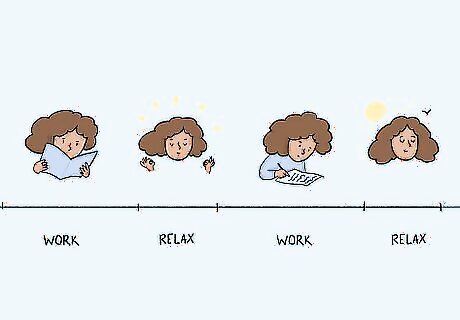
views
- To have a great future, identify your passions, and pursue them with curiosity: they’ll guide you to your purpose.
- Once you’ve narrowed down what you want to do with your future, set specific, manageable short- and long-term goals.
- Practice gratitude daily, and cultivate a supportive personal and professional network to lean on as you move toward your bright future.
Going After What You Want

Define your values. Before you can decide what you want to do with your life, know not just what you stand for, but also what you don’t. Being true to yourself will give you inner peace and help you define your ambitions. Make a list of 10 rules that you live by. These will give you an indication of what your values are. For example, if one of your “rules” is “I must never tell a lie,” then you value honesty. Or if one of your rules is “Never be rude to others,” then you value politeness. Once you think you’ve defined your values, check to see if they really are your values. Look at how you make decisions on a daily basis. Do they truly reflect your values? If you break your “rules” and you feel upset, guilty, or distraught, then that rule most likely reflects your values.

Pursue your passions to figure out what you want to do with your life. Nobody is born knowing exactly what they want to do with their future, but most of us have at least a few interests that can help us figure it out over time. If you haven’t decided what you want to do, curiously and actively pursue your interests; they’re your stepping stones to a great future full of purpose and meaning. For instance, if you enjoy reading, join a book club, attend local literary events (like poetry readings or book signings), try your hand at writing, get a job at your local library, or consider pursuing a degree in literature or library sciences. Journaling about your passions and values can help you clarify your purpose, as can speaking to trusted friends and family, a guidance counselor, mentor, or career advisor, or a therapist. But be sure not to let others’ opinions sway you too much. It’s very easy to slip into “autopilot” when pursuing a goal or to do things just because others are doing it or because they’re telling you it’s the right thing to do.

Set specific goals based on your values and passions. Ask yourself where you see yourself in 5 or 10 years’ time. What can you do now that will help you achieve these ambitions? Outline both long- (say, 5+ years) and short-term (say, 1-5 years) goals, and make sure they’re manageable and realistic. Research how you can make your passion fulfill your priority. What jobs can you get that make use of your passion? Search online for the skills, qualifications, and experience you’ll need to get your dream job. Read the biographies of people who you aspire to be like. Your ambitions may change over time. You only have control over your actions, not your circumstance. Make sure how you react and respond to your circumstances reflects your values. So long as your ambitions stay in line with your values, you will likely have a great future.

Check in with yourself regularly to make sure you’re still on the right path. Be intentional about the goals you choose to pursue, and check in with yourself every so often as you set out to pursue them. Whenever you make a decision in pursuit of your goal, ask yourself if it’s still in line with your passion: is this the best way to meet your goal and achieve your ideal future? Or are you just on autopilot? Questioning yourself will require monitoring the way you think and the things you do. Negative thinking styles will hinder your efforts to achieve your goals. Be sure to do this every night before you sleep if not constantly throughout the day. Self-monitoring will become habitual over time. Even if you feel certain about the goal you’ve set out to achieve initially, people grow and change over time: the goals you want to achieve at 25 may not be the goals you want to achieve at 30 or 40. It’s OK to reevaluate as you go and adjust as needed.
Learning from the Past

Forgive yourself for past mistakes. Know that your past does not define your future. You may have had some downs, some failed grades, or poor relationships. This does not mean that you will fail every exam you ever take or have poor relationships for the rest of your life. Everyone fails at times, but it’s how you respond to failure that defines your future success. The point of this is not to point fingers or lay blame on any one. Understand that you have some control over the quality of your life.

Learn from your mistakes. Look at things that may have gone wrong in the past and look at your behavior then and now. Forgive yourself. What lessons can you learn from your past errors? Is there anything you’re doing in the present that you know will have consequences that you will regret later? Acknowledge these, and do something that will be of benefit to you later instead. You will have to exercise some discipline and maybe alter your habits. It’s easy to repeat behavior just because it’s familiar.

Move on. Take the lessons you’ve learned and carry on with life. As your past has affected your present, your present will affect your future. Allow yourself to fully feel any grief you may have about the past—maybe you’re still mourning a friendship that went sour or a project you set out to do that didn’t work out the way you wanted—and let it go. Write about past grievances or discuss them with someone you trust. Express your view on the matter and why you’re upset about it. This will help you better understand your situation. Accept that what’s done is done and that you can only deal with the here and now. Forgive yourself for your mistakes and if you can, make amends with others. Internalizing your acceptance of the past may take longer than a day, so go easy on yourself if you find yourself still dwelling about the past a month from now. Your choices, habits, and behavior in the past made who you are today. It will take time to cultivate new habits that will make you who you are tomorrow.
Balancing Work and Play

Work efficiently. Remember that the quality of work you put into an hour is more important than the number of hours you put into the work. Sometimes working for a long time on something gives you the illusion that you are getting a lot done when really you haven’t had a productive hour. Be open and honest with yourself about the quality of your work. If you need help, ask for it. Other people might be able to give you better tips on how to do something efficiently and effectively. Write down everything you complete in a half-hour so you can see how efficiently you're using your time. Try the Pomodoro technique: set a timer for 25 minutes and do as much work as you can in that time, then take a break for 5 minutes. Every 4 Pomodoro intervals, take a longer break—15 to 30 minutes.

Take time to relax. Working smarter means taking small breaks while you work and also making a point to schedule relaxing activities into your day. This will improve your creativity and productivity and lower your stress levels. One popular study recommends working for 52 minutes and taking a 17-minute break to improve your productivity. Make it a point to do things that you find relaxing, such as yoga, meditation, painting, or reading.

Open a savings account. It’s always smart to save money for the future now. Set aside an amount that you will save every month. Make a list of special circumstances or emergencies under which you will use this money. If you are still studying, consider getting a part-time job. This will teach you the value of money and time, and instill responsibility and discipline in you. And when you have a part-time job, try to save money in GICs or high-interest savings accounts if you're a "safe saver". Alternatively, you can try to put money in the crypto market so you can earn a good amount of passive income for the future.

Build a social and professional network. Be kind to people. Build a network of people you can rely on for advice and support in the future. This includes your friends, people you work with who are higher in the command chain than you are, your peers, and your mentors and teachers. Look to those with more experience than you for advice on how to work towards the future you dream of. Even if your goal is something that they don’t have personal experience in, they can likely still give you solid advice or wisdom that applies to you, or just support and encouragement.

Lead a healthy lifestyle. Taking care of your health now will improve your chances of seeing your future through. A healthy lifestyle includes healthful eating, getting enough physical activity, getting plenty of sleep, good hygiene habits, and actively making time to relax and destress. You will see the benefits of these in your present as well as your future; a healthy lifestyle will have psychological, social, and physical benefits. To eat well, consult a nutritionist about the best kinds of food for your body type. Be sure to have balanced meals and to eat a full breakfast. Aim for at least 30 minutes of physical activity every day. How much you need as you age will change and will be affected by other health factors such as your current weight and your heart condition. Try to get about 8 hours of uninterrupted sleep each night, and avoid looking at bright screens at least an hour before bedtime to ensure the highest quality rest. Take care of your hair, your skin, and your teeth. Self-grooming will boost your self-esteem and make you feel more fresh throughout the day.
Practicing Gratitude

Reflect on the good in your life. Being grateful has long-term benefits on your health, work, and social life. Every night before sleeping, think of the good things that have happened that day. Include the things people have said and the things others have done for you. Reflect on the things you ate and the basic necessities you have. It’s easy to take these things for granted. Often, we are too busy thinking of the few negative experiences we have throughout the day to feel positive about the many good things. Sometimes, we suffer a great loss and need to grieve. Grieving does not necessarily mean that we are ungrateful and being grateful does not mean you’re not allowed to grieve. It’s a natural human process.

Train your mind to look for the good in everything. It’s easy to adopt a negative outlook on life. Actively looking for the positive aspects of every situation will help you be grateful. It will help you criticize and complain less and appreciate more. If you find yourself in an unfavorable situation, ask yourself what you can learn from it. If you find yourself in a generally low mood, ask yourself if what you’re thinking is based on fact or opinion. Is there truth to your thoughts? Think of other ways of looking at your situation. This doesn’t mean that you’re not allowed to have negative thoughts. Everybody has negative thoughts occasionally. Believing all the negative thoughts to be true is what will have a negative impact on your life including lower mood and motivation to work for a great future.

Thank people along the way. Make it a point to thank others who are a valuable part of your life or who have helped you do things to make a better future. Not only will this open the door to more beneficial relationships but will also improve your physical and mental health. Send thank you notes to professional acquaintances and be thoughtful and caring to those you’re close to.















Comments
0 comment